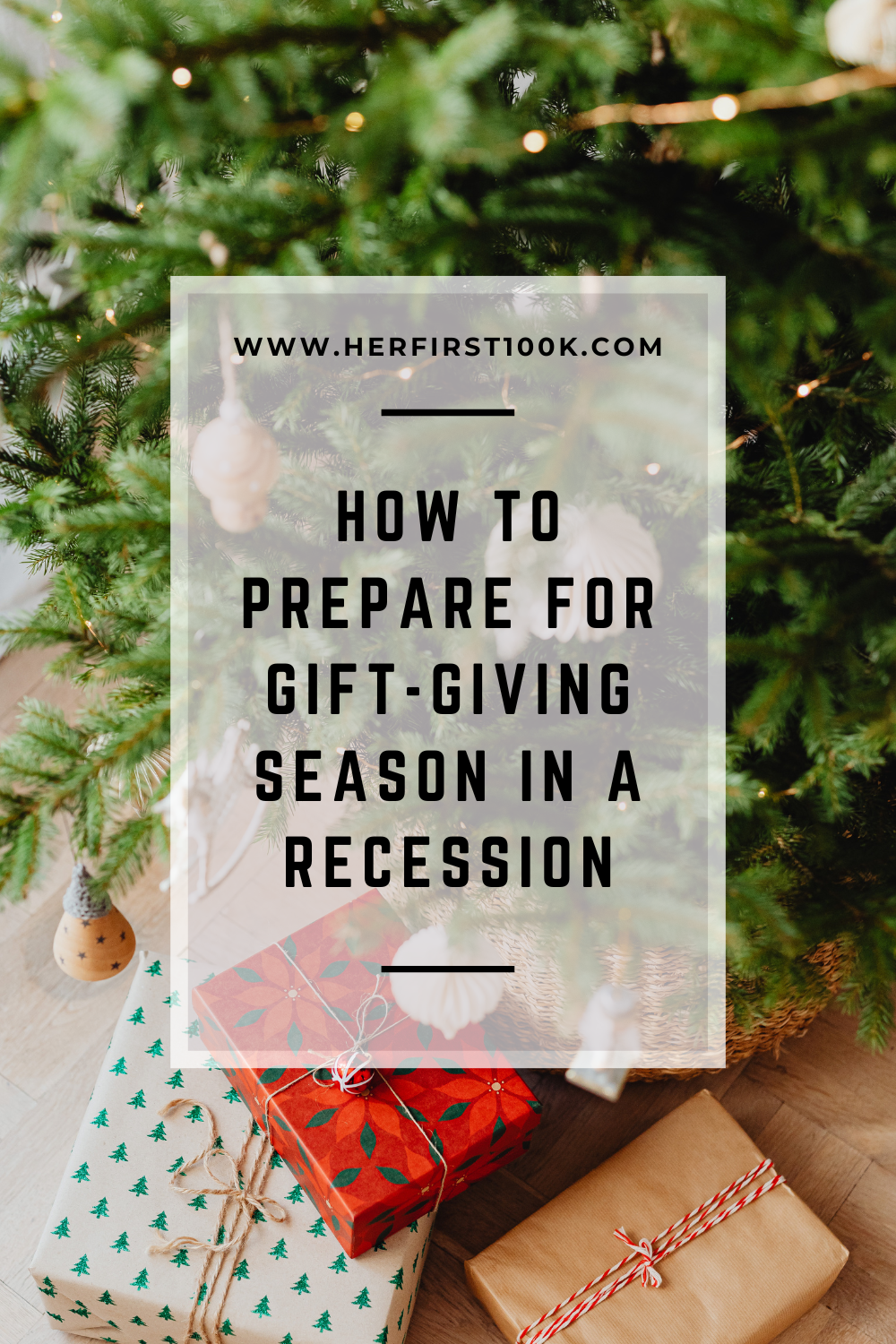The following article may contain affiliate links or sponsored content. This doesn’t cost you anything, and shopping or using our affiliate partners is a way to support our mission. I will never work with a brand or showcase a product that I don’t personally use or believe in.
The holidays should be a time to focus on family and “the season of giving,” but between buying gifts, traveling to family, and cooler temperatures bringing higher energy bills, this season can be a source of financial stress for many – especially with the financial pressures of an unpredictable economy.
Fortunately, though, this doesn’t have to be the case! We can still joyfully participate in this season of generosity while sticking to our budget, staying on track to reach our financial goals, and protecting our finances in the midst of an economic downturn.
Today we are sharing six strategies for preparing for gift-giving season in a recession so that you can give yourself the gift of a money-stress-free Christmas and financial peace of mind.
1. Revise your budget
Whether you are preparing for gift-giving season or want to set yourself up for financial success during the recession, the first thing you will want to do is revise your budget.
Due to the state of the economy, rates of inflation have been higher in recent years. This means that the budget that has been serving you well for the last few months or years may no longer be appropriate for our current rate of inflation. The same $30 you used to fill up your tank of gas is not going to go as far as it did a year ago, and the same goes for the amount you spent on gifts in recent years. So if you haven’t updated your budget in a few months, you may need to make some general adjustments.
While you’re taking a close look at your budget, I also want you to look for areas where you can cut unnecessary spending. Looking at your current subscriptions is a great place to start, as there may be a few that you don’t actively use or need right now. Canceling or pausing those subscriptions may create the extra wiggle room in your holiday budget that you have been looking for.
Don’t have a budget? Don’t worry, now is the perfect time to make one. Not only will a budget help you stay on track with your holiday shopping, but it will also set you up for financial success in the new year!
2. Set a holiday spending limit
Here’s a surefire way to land on HFK’s Nice List: set a holiday spending limit before you start any of your holiday shopping (before being the keyword here).
Oh and in case you missed it the first (…and the second) time…
…set your holiday spending limit before you start holiday shopping.
Was that a little excessive? Maybe. But we are real people over here at Her First $100K™, and we know how easy it is to base our spending limit around how many people we need to buy for, rather than building a shopping list around how much we are planning to spend.
When we determine our spending limit by the number of people on our Christmas list, it’s a pretty safe bet that we are going to ultimately spend more than we were planning on. You may start your holiday shopping with the best intentions, but without a firm spending limit, it’s easy to get carried away and – before you know it – you’re only halfway through your Christmas list and have already spent more than your Christmas budget.
But when you create a firm holiday spending limit before starting your holiday shopping, you will be encouraged to shop with a spending limit that has been set with your holiday budget and financial goals in mind.
So before you add anything to your cart, take some time to sit down and review your existing budget, current income and expenses, and financial goals you hope to reach by the end of the year to determine how much money you feel comfortable setting aside for Christmas shopping. Write that amount down and commit to not spending over that limit.
3. Put your holiday fund in a HYSA
Once you have determined the amount of money you plan on spending on holiday shopping, put that amount into a separate vault in your high-yield savings account (HYSA).
Not only will this remove some of the temptation to spend any of that holiday money on things other than gifts, but it will also allow that money to earn as much interest as possible while it just sits in your account as you plan your shopping. Plus, you’ll be able to more readily see how much you have left in your holiday budget.
And while we’re on the subject of HYSA’s, we can’t help but mention that if you haven’t put your emergency fund in an HYSA yet, now is the time to do so. With the economic pressures of the current economy and job market, it’s so important to be prepared for a financial emergency. We suggest having a minimum of three months of essential expenses saved up in a high yield savings account so that you can have something dependable to fall back on, while also allowing that money to earn as much interest as possible.
Don’t have a high-yield savings account? It’s not too late to get started! Opening your account will only take a few minutes, so you can start earning more interest today. Click here to learn about the HYSA we recommend!
4. Write Down Everyone That You Need to Buy a Gift for
Once you have settled on a spending limit and popped that amount into your HYSA, you can begin to really plan out your holiday shopping – starting with writing down every person that you need to buy a gift for.
Now we know that this may feel a little tedious, but this process will really help you set expectations on how to break down your budget, buy budget-appropriate gifts, and stick to your spending limit. After all, the last thing you want is to be wrapping up your Christmas shopping and maxing out your spending limit only to realize that you’ve forgotten to buy gifts for your partner’s mom. Yikes.
We are making this process as easy as possible with our FREE Gift Tracking Spreadsheet! The perfect place to write down your list of gift recipients, plan out their presents, and make sure that you are staying on track with your holiday budget, this downloadable spreadsheet will be the gift that keeps on giving!
5. Plan Ahead & Take Advantage of Sales
We all know the age-old adage, “beggars can’t be choosers,” but we are firm believers in a less-common (but just as true) money mantra: “last-minute gift-buyers can’t be budgeters.”
Here’s the thing: when it comes to holiday shopping, there are two kinds of gifts that get snatched up first:
-
The most in-demand items
-
The most affordable items
Needless to say, if you want to deliver thoughtful gifts that also align with your budget, you aren’t doing yourself any favors by waiting until December 24th to complete your holiday shopping.
The earlier you get your holiday shopping done, the better your chances of finding truly meaningful gifts that also align with your spending limits. Plus, intentional planning can also allow you to take advantage of sales or promotions that give you even more wiggle room in your budget.
6. Do what’s right for your budget
This is a piece of financial advice that you can use all year long, but is especially important to keep in mind during the holidays. This time of year, there is a lot of pressure to overspend, over-consume, and over-compare your holidays to somebody else’s, and this can result in a season that feels a lot more stressful than joyful.
But if you’re not thinking about the amount of money people spend or exactly what’s under the Christmas tree with your name on it, neither will your loved ones.
So as you navigate this gift-giving season, remember that this season should be about connecting with loved ones, cultivating generosity and compassion, celebrating the beauty of the season, and/or embracing your spirituality. Additionally, what makes the best gifts are the ones that are meaningful, and that preserve your financial and mental well-being.
Key takeaways
-
Revise your budget to make sure it is appropriate for today’s economy and rate of inflation.
-
Set a holiday spending limit based on your everyday budget, income, expenses, and financial goals.
-
Put your holiday fund in a high yield savings account so that your money will earn as much interest as possible while you do your holiday shopping.
-
Write down everyone that you need to buy a gift for so that you can plan accordingly and aren’t surprised by having to buy unexpected gifts.
-
Plan ahead and take advantage of sales in order to get the best prices.
-
Do what’s right for your personal holiday budget.
I get asked all the time: “where do I start?!” Take our FREE quiz for a step-by-step plan and actionable resources to meet you at each stage of your unique financial journey.






